- What John Lennon Thinks of Donald Trump - November 14, 2016
- The Meaning of Fun: The Paul is Dead Rumor - February 3, 2016
- BEATLES-STREEP-SHEA SHOCKER: IT’S NOT HER!!!! - August 13, 2015
DEVIN McKINNEY • Warning—there’s a lot of rant here, most of it to do with Albert Goldman but some of it just my articulated flailings about the nature of biography and criticism, writers and readers. But Michael asked, I answered, this is our blog, and we make the rules. So strap on your poncho and feel free to skip around.
Reading the “Drugs and Differences” comments, I took special note when the ghost of Albert Goldman reared its shiny dome. He’s so easy to despise and so difficult to defend on any level, but I’m always curious about the case to be made in favor of things found by conventional wisdom to be irremediable. I also think Mike makes good points. (For one thing, I’d forgotten Bob Spitz used Goldman’s interviews in writing his book, which I thought was first-rate, probably the best single Beatles bio yet—amazing, since Spitz’s preceding biography, of Bob Dylan, which also thanked Goldman, was close to terrible.) Then, when Michael asked what I thought about Uncle Albert, I pulled out my Lives of John Lennon first edition (it might be worth something someday) and looked at the notes I took while reading it in the summer of 1988, for the first and (I’m quite certain) last time.
As a writer—more a critic than a biographer, but a critic who’s written at least one book that played by the rules of biography—I look at the book somewhat differently now. In 1988 I was 22 years old, a righteously pissed-off Lennon fan and Rolling Stone subscriber (Goldman had been preemptively attacked in an epic cover story). So my notes allow AG only a few positives. I highlight his factual errors and quarantine [with brackets] his frequent outbreaks of wretched style; where the text is inoffensive or passable, the margins are blank.
I still agree with most of my notes, but now find a number of them reactive, snarky, and unfair. For example, an early-pages observation: “G[oldman] accepts John’s self-analysis when it fits his own thesis, otherwise not.” What I see now is that anyone who wishes to reach a conclusion, favorable or unfavorable, slanted or equitable, will do that—biographers, critics, scientists. You start out, if you’re honest, by ingesting information and impression without preconception. But comes a time you have to go with your gut on what is true or false, sturdy or flimsy, what works and what doesn’t, what is the unwilling self-revelation versus the canny self-promotion. You have to venture any number of hunches about where your real story—i.e., your subject—is hiding. That means following certain avenues of inquiry and rejecting others; that means leaving out what you find to be unimportant, tangential, unproductively evasive, or simply false to the subject’s character as gleaned from your overall research. In a word, if you want a thematically shaped response to a subject’s life, you have to select—thereby leaving yourself open to charges like the one I made against Goldman in 1988.
The Lives of John Lennon is rich in factual errors (some listed below). I have more sympathy for biographers and their mistakes since learning for myself how easy it is for the stupidest, most obvious and confounding of errors to simply escape notice, even in the course of numerous drafts and countless hours of concentrated labor. I was fortunate enough to have a copy editor with an unbelievably keen eye, so 99% of the errors in my Henry Fonda biography were caught, many to my cringing embarrassment. But I know that others, as yet undetected (at least by me), and probably attributable to nothing but a momentary lapse of focus, managed to survive. We’re human, and that simply happens.
Goldman has a near-obsession with the subject of plagiarism, especially unconscious. “A whole book should be written about plagiarism in pop music,” he writes parenthetically in The Lives, “not only to expose the thieves and give belated credit to their victims but to illuminate the fascinating processes by which ideas are spawned and spread in the mental incubator.” This gives a sotto voce shout-out, as it were, to Goldman’s first book, The Mine and the Mint, all about the uncredited borrowings then-Professor Goldman dug up in the work of 19th century English memoirist and opium addict Thomas de Quincey. So I hopped with excited memory (or memoir) when I read, many pages later, Goldman’s description of a 1968 John and Yoko art installation where the entire contents of a room were cut in half. Goldman refers to the room’s putative “half-witted decorator”—and I said, wait a minute! Sure enough, I’d seen that joke before, in a contemporary London newspaper report on the show. See it quoted in Nicholas Shaffner, The Beatles Forever, p. 105.
But here too I have to give Goldman the benefit of my older and I hope wiser doubt. Unconscious plagiarism happens, conscious plagiarism happens, and if it amounts to a few words as in the above example, that means only that the writer had the sense to swipe a good line. Referring to the editing of Eat the Document, a D. A. Pennebaker-filmed record of his 1966 UK tour, Bob Dylan said he cut the film “fast on the eye.” Many years later, that exact phrase, which I have encountered nowhere else, turned up in an essay by Greil Marcus, Dylan’s most famous critic, about the best movies of the 1980s, in reference to Walter Hill’s editing style in 48 Hrs. So what. It’s intertext, interchange, intercourse, and when confined to a few words it’s mostly okay. Closer to home: a sentence in my third paragraph above—about a critical study “playing by the rules of biography”—is a not-so-unconscious lift of a near-identical line in the first chapter of Norman Mailer’s “novel biography” of Marilyn Monroe.
Similarly, I now grant Goldman the license to do certain things, make certain surmises, cross certain lines that others, both writers and readers, honor to the point of sacrosanctity. This may be mainly because I, unlike many people, take it for granted that biography is simply another form of creative writing. All writing is creative, since writing literally creates something that wasn’t there before those words were structured in that way, to that purpose. (Is it good writing? Totally different question.) But obviously it’s trickier in biography, because a) you’re writing about a real person, not a fictional character; b) the people most inclined to read what you write about that person are also likely to have the intensest personal investment in seeing them depicted in a certain way; and c) what no one realizes until they try to write a biography is that the biographer has, in every sense, to create his subject. That act of authorial creation, the passing of blood between the author and his or her absent obsession, is what makes the subject come alive for the author—and what should be needless to say, the subject has to live first in the author’s mind before he can live for a reader.
What fact-mongers and the terminally literal-minded never understand is that facts alone will not bring a subject alive. To pretend that a biography is, or should be, nothing but a data dump, free of opinion, point of view, personal prejudice, or creative temperament, is to willfully ignore how human minds work—let alone the very things that tend to make a biographical subject important to us. The biographer is not a mommy bird gathering, chewing, dissolving, and regurgitating fact food for direct deposit into the open throats of her blind, squealing babies. For a biographer to pretend to that role is insulting. For readers to ask so little credit for being sentient, processing beings is stupefying. Yet many readers claim to want just that.
Facts can take you up to the surface of the subject’s skin. You need them to even find where the skin is. But you don’t stop there, because you’re stopping at the level that anyone can see. You’re stopping at the OBVIOUS, and it’s not the job of creative writing to stop at the OBVIOUS, and merely confirm our mythological Average Reader in his or her preexisting opinions. To get any deeper, to venture near the hidden parts of genius or insanity, beauty or murder, where the prize of the NOT OBVIOUS waits, you have to allow yourself license and latitude. Using fact, informed opinion, the evidence of the subject’s work and the public record, and finally your own intuition, you have to decide what comprises your subject’s character, values, patterns of good and bad behavior, weaknesses and strengths. You have to grant yourself the license to indulge in some amateur psychologizing—provided you accept (as many readers of biography seem not to) that psychology is a real thing, and a determinant in human affairs. You have to form valid opinions based on clinical research, and remain ever skeptical of your own BS, making sure your psychobabble hews as closely as possible to contemporary DSM authority and is not just whiffed out of some poetic ether, or a teenage reading of Sybil. (Goldman would fail this test.)
At each point, you have to monitor your biographical creation for human plausibility, adherence to evidence, and thematic consistency—while holding in mind as you write each sentence that human beings can be and are radically implausible, defiant of evidence, and comically inconsistent. Even then, you’re not guaranteed that anything—least of all aesthetic and financial success—will come of your having lived in these varied states of pretzel logic for however many years you’ve foolishly devoted to the enterprise. But you have to take that chance to accomplish anything other than a waste of trees.
I have to acknowledge that Goldman—along with biographers I admire, from Janet Malcolm to David Thomson to Nick Tosches—begins from the premises described, and advocated, above. What distinguishes him, if that’s the word, is that he takes his license and latitude to such implausible extremes, going beyond a defensible use of defensible premises through a combination of arrogance, ineptitude, morbid compulsion, and really tortuous rationalizing. From my notes:
First, the pros, since they are relatively few. The main gain for me, as for Mike, is the background on Yoko, which simply didn’t exist at that time and to my knowledge still doesn’t. It amazes me that no one has yet completed (or even attempted?) a serious, comprehensive biography of one of the later 20th century’s best-known, most controversial, most well-connected and self-defined women. But when they do, Goldman’s research will be the foundation. (This is comparable to the investigative work AG and his stringers did on Colonel Tom Parker for the Elvis biography—also a case of a hate-filled book with an undeniable wealth of hidden history.) More generally, I felt there was a very nice, gritty sense of Liverpool given in the “Artist as a Young Punk” and “Mersey Beat” chapters, both of which moved well and were powered by precise imagery. Goldman can write well when he wants to (his Lenny Bruce biography has an incredibly vital sense of place, event, explosion, stagnation), but he so seldom wants to.
There are also good observations sprinkled throughout the book. “The Beatles’ primary achievement was to lift American pops [sic] off its foundations and transport it to England, where they transformed it into another music entirely.” True, that “transformed . . . entirely”; obvious, but true. And much later on: “Though John extolled spontaneous composition, adoring those songs like ‘Across the Universe’ that were ‘given’ to him, his best work was usually the product of slow, accretive gestation.” A point which is not only true but seldom made.
On to the cons. They call for bullet lists:
Self-puffery
— Goldman calls Two Virgins a “soiled air filter” of an album. He’s not wrong, but the point is that he then extols himself (in the third person) for testifying in court against the banning of the nude cover—despite having already testified (to us) that the record had no redeeming social value.
— Goldman lists his own interview with Lennon for a publication called Charlie (June and July 1971) as one of Lennon’s “major statements” on “his own character and history” (two of the others being the Rolling Stone and Playboy interviews). I’ve tried to locate this interview and haven’t found it reprinted anywhere. No Lennon source that I am aware of quotes it. According to p. xxii of The Lennon Companion, the entire interview comprised eight pages.
Poetic license to kill
— John hears Elvis for the first time: “Never has a writer or performer received a more powerful and compelling summons to his profession.”
— John had dyslexia, “a common neurological complaint”—and coincidentally the trendiest celebrity disorder of the late ’80s.
— Hearing “Happy Xmas (War Is Over)” for the first time, Phil Spector shouts, “That’s a direct steal from my 1961 hit with the Paris Sisters, ‘I Love How You Love Me’!” That’s not human speech, that’s uninspired rock writing!
— “Perhaps [John] would complain of sexual deprivation, demanding that if [Yoko] didn’t want to fuck him, she should at least provide suitable substitutes, like some nice young girls—or boys!” Why not!
— Goldman imagines John indulging his Caligulan lusts in “a Korean brothel on 23rd Street,” without any “danger that these illiterate foreign prostitutes would create a scandal by, as Yoko put it, ‘writing a book.’” Perverse how the absence of testimony is tendered as a form of truthiness. Perverse as well how Goldman cannot resist picturing his subject in lurid sexual situations.
— “Alexa Grace looked at twenty-five like the young Ingrid Bergman of For Whom the Bell Tolls. . . . she had the shy, withdrawn personality of Laura in The Glass Menagerie.” It’s not horrific to apply two film or literary references to a single person—but in the space of two sentences?
— On a late ‘70s trip to the Far East, “John might have also indulged himself with a Thai boy . . . it is likely he had a nice long layout in the cathouses of Bangkok.” Yet later on in Tokyo, John, living “like a turtle”—withdrawn, in a shell—is said to be “indifferent to the garish pop culture of Japan, the ‘floating world’ of geisha girls, the porn shows…” Damned if you do fuck a teenaged prostitute, damned if you don’t.
— Defending Dakota-era aide-de-camp Fred Seaman’s thefts of machinery, tapes, journals: “It is characteristic of many rich people to conspire with their retainers to be cheated rather than to confront their true indebtedness to these invaluable people by paying them what they deserve.” That is sophistry for the ages. It’s at least as characteristic of many skulking functionaries to feel they have been shafted by the star-employers they pretend to worship and serve, and to get their revenge by stealing and selling the scraps of private life with which they’ve been entrusted. Seaman is a chief AG informant on the Dakota years.
Errors of fact
— What G calls “John’s most celebrated exchange with the press” was actually a Ringo scene in A Hard Day’s Night (“I’m a mocker”). Ironic that this piece of fiction got into AG’s memory as real-life speech, since he goes on to denigrate the Beatles’ first film in the harshest terms.
— “I’m All Shook Up” (Elvis’s “All Shook Up”)
— “Mary Lou” (Ricky Nelson’s “Hello Mary Lou”)
— Moon Dogs (Johnny and the Moondogs)
— “Hello Little Girl” was John’s song, not Paul’s.
— Ronnie and the Ronettes (The Ronettes)
— “I Want to Be Your Man” (“I Wanna Be Your Man”)
— “(We All Live in a) Yellow Submarine”
— AG calls “Any Time at All” “the most exciting song in the Beatles’ first film score.” It wasn’t part of the film score.
— “You’ve Got to Hide Your Love A-way” (probably a typo, but bad proofreading abounds)
— “(Baby, You Can) Drive My Car”
— “Drive My Car” is Paul’s song, not John’s.
— “She Said She Said” is given as merely “She Said” (so he’s half-right).
— There are no “hoedown fiddles” on “Tomorrow Never Knows.”
— Maharishi is not on the Sgt. Pepper cover.
— “One After 9:09.” The title refers to the train number, not the time of day.
— The Ruttles
— The Rutles was not a Monty Python project.
— John and Paul’s songwriting company was Maclen, not Lenmac.
— All Things Must Pass was released as three LPs, not four.
— “A. J. Webberman” should be A. J. Weberman. The once-notorious “Dylanologist” (known for scouring Dylan’s Greenwich Village garbage cans for proof of … something) is also one of AG’s chief sources on Lennon’s radical chic period. Which doesn’t save him from being misspelled.
— The 1978 Bee Gees/Peter Frampton musical Sgt. Pepper’s Lonely Hearts Club Band is referred to as “the Beatles’ film.” The Beatles, of course, had nothing to do with it.
— Bob Dylan’s “You Gotta Serve Somebody” (“Gotta Serve Somebody”)
— “Serve Yerself!” (John’s “Serve Yourself”)
— “Nobody Told Me There’d Be Days Like This” (“Nobody Told Me”)
— “Bob Ezra” should be Bob Ezrin. Famed whiz-kid producer of Lou Reed, Kiss, Pink Floyd, many others.
Goldman, unlike myself, clearly did not have the services of a good copy-editor/fact-checker—or maybe even a bad one, from the evidence. William Morrow, a major publishing house with a stellar reputation, seems to have abrogated all editorial responsibility for this project.
Crimes against style
— “Before he heard ‘Heartbreak Hotel,’ John Lennon was a Nowhere Boy.”
— John meeting Paul: “a meeting destined to influence the whole future course of pop music.”
— Lennon “presents himself in song exactly as he did in life: as a hard case with a demand on his lips and a threat in his throat … [He] will do whatever it takes to get that little girl out there on the hook where she can cop the cash he craves. There’s no sexual heat in this guy and no congregational fervor around him. He’s a mack man, lean and mean, with a voice like a knife made of cold-rolled steel.” Mickey Spillane lives! But why here?
— Goldman insists on the weirdly outdated plural “pops,” as in “pops music.” So old-fogey, it’s like a whiff of mentholatum every few pages.
— Exclamation points are out of control!
o “John catches her in the act! … threatens to set her hair afire!”
o “So Freddie took off with John, intending never to return!”
o “He had become Beatle John!”
o “…upholstery!”
o “…the Dutch!”
— His slang is wack, yo!
o “rap”
o “youthquake”
o “to the max”
Unsupported, self-contradicted “sellout” theme
— The Beatles were ruined by “the emasculating hand of Brian Epstein.” This is part of a larger antipathy toward Epstein (“spoiled rich kid”; “Nobody in the history of show business ever took such a screwing” as did the Beatles by their manager).
— “Lennon succumbed to the enticements of commercial success. Rather than work to bring the public around to his vision, he adapted himself to the tastes of the mass audience.” Goldman never comes closer than the Spillanian pimp fantasy to telling us what he thinks Lennon’s lost vision was, or would/should have been.
— “‘Selling Out’ is the missing chapter in the history of the Beatles. It’s the chapter that nobody has ever wanted to write.” Including Goldman, who says the words but never writes the chapter.
— “By going commercial, the Beatles had reduced themselves to a formula.” But then this, a couple of chapters later, on Revolver: “The eclecticism of the Beatles, always one of their most striking features, explodes here in a dazzling display of artistic diversity.” So they sold out to what—eclecticism, explosion, dazzle, artistic diversity? Fine! The world has enough knife-wielding pimps.
Finally, for the best part-by-part disassemblage of Goldman’s shoddy craftsmanship and sleazy techniques, see Luc Sante’s multi-Beatle book roundup from the New York Review of Books. Luc is a friend, but I think he’d appreciate the irony if I point out that in his essay’s very last line, he, like Goldman, mistakes a line from A Hard Day’s Night for a real-life exchange. See what I said—mistakes will always slip through.

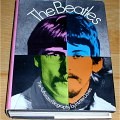

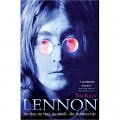
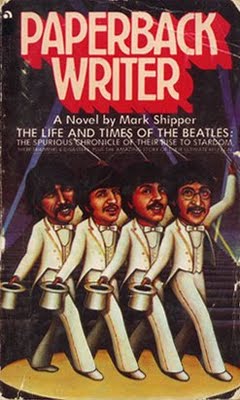

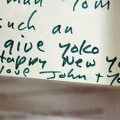
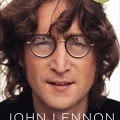

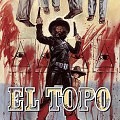
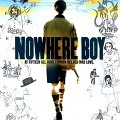
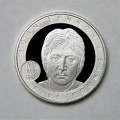
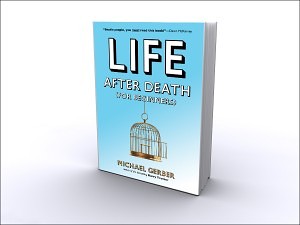
Devin, I love this post so much Albert Goldman could spin it into a lurid tale of infidelity. THANK YOU,
The question is: all these errors of fact and editing and good taste aside, do you think AG gets John right? If not wholly, what part? If not at all, where do you think he goes wrong?
One of your quotes reminds me precisely why I found the book so compelling: “…Korean brothel on 23rd St.”
1) That sounds like clumsily integrated interview material, eg,
“They weren’t having sex? How did that work?”
“John used to go to a brothel on 23rd.”
“Why that one in particular, do you think?”
“It was Korean, and the prostitutes there were undocumented and illiterate, so they could never talk…You know, write a book ‘I Fucked John Lennon.’ Yoko was paranoid about that.”
I know I’m making that all up, but that’s what happens in my brain when I read that sentence, and probably why I give Goldman so much more slack than others do. Norman did that a bit for me with Shout! but that’s it.
The only place I’d part ways with you, Devin, is the part where you talk about stars and their underlings. Maybe your experience has been different, but I’ve gotten to know a lot of assistants serving bigwigs at every level of the showbiz food chain (names not available upon request), and I’ve been utterly appalled at how shittily the underlings usually get treated. There’s a great novel to be written about the weird dependency and resentment that passes from star to assistant and back again; but in a purely economic light, it’s closest to slavery. In exchange to proximity to greatness and perhaps opportunity, the star has everything but the assistant’s very life in his/her hands–assistants can be fired at a whim, accused of theft, prevented from ever working in showbiz again, all with a single phone call. I’ve had friends who’ve been fired by their (revered in the press) bosses for getting cancer, not sleeping with their boss, being too old, and so forth. Does the assistant have some power over the star? Yes, if they are truly Machiavellian, but most assistants I’ve met genuinely admired the person and were devastated by what happened. If the star is a jerk (as so many seem to become it’s clearly the state of wealth and fame, not the people) the assistant will get screwed, somehow, before the relationship is through. Probably as punishment for the star’s dependence? Ya got me–but have a little compassion for Fred Seaman, and think twice before you believe Yoko’s side of that story.
Starpower also explains why there hasn’t been a Yoko bio, and likely won’t be one, ever. There is NO financial benefit for a book publisher in that project, unless it’s an authorized (or Norman-esque might-as-well-be authorized) bio. Anything that departs from the party line will be sued; and because Yoko is such a polarizing figure, the only people who would buy a Yoko bio are Yoko fans, ie people who don’t WANT to hear anything but hagiography. Which is a shame, because she’s a pretty fascinating gal. (That’s right, I called Yoko Ono a “gal.”)
Goldman’s book is a hit-job, but it’s a testament to how immense a figure Lennon was in our culture in 1988; 1200 interviews costs money! To me, The Lives of John Lennon isn’t really a music bio–it’s closer to the anti-Clinton or anti-Hillary (or anti-Bush) books that are printed. I judge it on that curve, and see it as proof positive that Lennon was, after 1968, primarily a political figure, not a musical one.
Devin, never have I laughed so hard while reading something so trenchant. Absolutely great.
I agree that every biography worth reading takes an interpretive stance, and that that inevitably involves selection and emphasis. In fact, I think strong emotional engagement, even where obsessive/negative, tends to produce a biography of more value than one in which the writer is disengaged or dismissive of his/her subject. Negative obsession produces more heat than light (e.g. Goldman), but lack of real connection produces neither.
God, I’d forgotten that Goldman said of Lennon in performance that “There’s no sexual heat in this guy and no congregational fervor around him. ” Now, that is plainly insane.
@Mike, on any bios of Yoko, even if books that departed from the party line would generate lawsuits, wouldn’t the authors win unless they’d made false statements of provable fact? I sure hope so, given the 1st amendment. Though I can see how the specter of such lawsuits might keep publishers from being willing to list such a biography.
This comment has been removed by the author.
@Nancy, it doesn’t matter if you win. Defending yourself in court would be so costly, and so drawn out, that any possible profits from such a book would be eaten up. Plus, you’d lose any chance to bid on future Beatle-related projects.
Also, I wanted to add: I just realized I don’t think of Goldman as a biographer. I think of him as something much closer to Hunter S. Thompson.
“One of your quotes reminds me precisely why I found the book so compelling: ‘…Korean brothel on 23rd St.’ “
That’s what I thought, too, and that’s why I’m persuaded that this book is worth reading (and, to that end, I plan to pick it up).
I feel that, with Philip Norman’s book, there’s at least a decent biography of John Lennon up to 1965. With Yoko still alive and litigious, it’s hard to imagine we’ll get an exhaustive, psychologically plausible, unwhitewashed account of the last fifteen years of his life, though, which is really sad, because that’s the most fascinating and, in a sense, almost tragic part of his life. Julia getting run over by a car was tragic in a personal sense, for Lennon, but the story of someone achieving everything they ever wanted, feeling more lost than ever, and careening from false solution to false solution until they begin to whither and withdraw, out of touch with their talents, out of touch with their friends. I want to read a book that answers whether, like I suspect he was, Lennon was voluntarily trapped in that relationship the way he was trapped in the Dakota, behind that impenetrable façade. I want to read this not because, like Goldman, I want to see him fail and fall, but because, as Michael’s often pointed out, that’s what makes him human and empathetic. To know that Lennon struggled with neuroses or anxiety or depression is much more relevant to most people than knowing he was tripping on LSD a lot. To know that he needed to mend fences that he couldn’t bring himself to mend is a much more important story than “he didn’t touch his guitar for five years.”
And it uncovers an additional layer of his psyche if, all the time he was being so open and honest with the media, he was actually keeping them at a distance and dissembling as much or more than his famously guarded contemporaries like Dylan, McCartney, or Jagger.
-Michael
*I never finished a thought there: Julia’s death was personally tragic for Lennon, but his last decade or so could arguably be seen as “tragic” in the classical sense.
Thanks, Mike and Nancy. Mike, this may not be what you mean by “does Goldman get him right,” but surely there is no objective, essential, unitary Lennon out there to be gotten right by any single biographer. Goldman gets pieces of him, as Coleman and Riley get pieces. Goldman gets the drugged-out, empty-eyed sensation seeker and ego machine Lennon probably was for hours, days, months at a time, maybe for an entire year here or there. But one can be right on the pieces while creating a larger picture that departs from reality.
Finishing the book, I felt I’d been in close quarters not with a person but with a hulking, shadowy monster. Since Goldman doesn’t really credit Lennon’s genius or his achievements except in glancing praises that are contradicted on every other page, it is the ogrish mediocrity that emerges, not the tortured, often self-centered artist. Instead of leaving me shaken because it brought up hundreds of hints and suggestions and resonances with words and images and feelings I’d absorbed from years of Beatle study without knowing it, the Goldman portrait left me alienated because it resonated so little.
So no, I don’t think he gets him right. I find it very easy to believe that John was muffled and stunted by drugs, self-indulgence, Yoko, his own laziness and fear. What Goldman constructs from these eventualities is not a melancholy portrait of creative and existential decline but a one-dimensional nightmare, lurching and laborious, about a non-person who is at once peripatetic and barely functional. On the levels of psychology, literature, and what I call “human plausibility,” the book is simply foolish.
That doesn’t mean it lacks all value, as I said. But it does mean that if Goldman gets those pieces of Lennon, he gets them only while executing an authorial agenda that leads him to seek out every noxious or unfortunate incident in Lennon’s life and then magnify the sum until it becomes the whole equation. But I would never suggest anyone not read, or fight through, the book. For its undeniable coups of research, its ill fame and controversy, and its extremity of approach, it is for better or worse one of the essential books about the Beatles, and anyone who cares about them, not to mention Lennon in particular, ought to read it.
Devin, I agree that no one biography gets all of Lennon, or could. I think the value of Goldman’s book, besides its original research, lies in its being written while memories of Lennon’s life were relatively fresh, and its not being in thrall to the view of Lennon the estate wished to promulgate.
If the Revised Standard Version of Lennon’s life hadn’t been so heavily promoted by 1988, and if that narrative weren’t still pretty dominant, there wouldn’t be a need for Goldman’s book. Goldman gets so much so wrong, but precisely because he’s fascinated by the dark side of Lennon’s life, he uncovers aspects the official line didn’t — and still doesn’t — want to acknowledge. The last five years of Lennon’s life, in particular, don’t make much sense unless we grapple with the things Goldman, Seaman, Pang, et. al. have to say. So I’m agreeing with you and with Michael (I think) that the Yoko background, and the access to Lennon’s life at the Dakota, are things that Goldman gets at least partly right.
IMO the Lennon estate and journalism like Rolling Stone’s created the need for such a book by relentlessly promoting a version of John Lennon with all the darkness airbrushed out. Goldman sure does tend to take “every noxious or unfortunate incident in Lennon’s life and then magnify the sum until it becomes the whole equation.” Those incidents are very far from the whole equation, but they are part of it, and a part of it that, at least for a long time, was denied or overlooked.
The crazy thing is, as many on this blog have said, that LENNON DOESN’T NEED MYTHOLOGIZING. What he actually achieved, who he actually was, is plenty. I find the estate’s hostility toward treatments of Lennon that don’t toe the party line completely (for example, Norman’s bio) both unnecessary and deeply ironic, given that one of Lennon’s most profound statements is “one thing I can tell you is you got to be free.”
On the other point, Mike, about rich people and their servants, I don’t know anything about those imbroglios beyond what I sometimes see in the news. And without doubt there’s some truth in Seaman’s various testimonies. But that vagary and other celebrity situations aside, Goldman errs in going out of his way to make such a convoluted and hypothetical defense of a felonious informant. (Seaman has always protested his innocence, but a judge found him guilty.) He’d have been smarter to acknowledge the worst that might be said of Seaman, then argue for the validity of the information anyway. Instead he uses Seaman’s perfidy as another source of innuendo by which to club John and Yoko. That’s just rancid journalism.
Like all others in his position, in the US anyway, Fred Seaman wasn’t an indentured servant; he could have left the Lennons’ employ at any time. Instead he stayed, took their abuse and threw out their diapers for low pay while pretending fealty, and then, at the most loathsome conceivable time, stole their stuff and tried to sell it. Assign credibility accordingly.
I’d have more respect for Seaman if he’d simply written a tell-all book. Oh wait, he did that too. Most recently, he made yet another mini-splash for himself by claiming all over the blogosphere that Lennon had turned into a “closet Republican” before his death. When your revelations all tend to run one way, toward the grim and idol-smashing, I wonder more about the psyche of the smasher than the idol.
You’re absolutely right, Nancy, that a value of the Goldman book is that it gets a lot of things into the record that might have slipped through cracks in time. And I can’t agree more about the need for some corrective to the tiresome goddamned Standard Version as propagated by Yoko Ono Inc., Jann Wenner, CEO.
Obviously, one wishes the corrective had come in some other, less distorted form. Goldman jarred a lot of complacencies, but by going to such an opposite extreme he did nothing but create the need for yet another kind of corrective.
So it will ever be with a figure like Lennon. Biogs will continue to be written because there’s always some “new” angle that cries out to be taken–or so publishers and readers will always be led to believe. I’ve not read the Norman biography; that’s a gap I need to fill. I would count the Coleman bio as virtually negligible were it not for the odd insights afforded by his insider status (London, sixties, close to Epstein), though this very insiderness engenders numerous blind spots (his hysterical denunciations of the Lennon-Epstein Spanish sexcapade being merely the most memorable). Also, it’s not clear to me how much Coleman cares about the music.
Tim Riley’s biography is probably the least inside, and close to being the least sensational, that exists, but of the ones I’ve read, it’s easily the best–sympathetic but not slavish, skeptical but not snarky, musically passionate and historically informed, with a lot of novel research. (He acknowledges my book, but that has nothing to do with it!)
@Devin,
“What Goldman constructs from these eventualities is not a melancholy portrait of creative and existential decline but a one-dimensional nightmare, lurching and laborious, about a non-person who is at once peripatetic and barely functional.”
This, and the rest of your summation, is the best statement on Goldman I’ve ever read. Just superb. Thank you.
@Nancy,
“I think the value of Goldman’s book, besides its original research, lies in its being written while memories of Lennon’s life were relatively fresh, and its not being in thrall to the view of Lennon the estate wished to promulgate.”
This is HUGE, and we Dullbloggers tend to forget just how huge. For everybody who reads this site, there was something about The Beatles that struck a chord. For myself, if the only portrait of John Lennon available was the Yoko-approved one–ie, the person you see in the “Imagine” movie–my affection for the man would’ve moved on very quickly. Because you know what? It’s boring, and feels false. It’s Lennon as a corporate brand, and that’s particularly offensive because the “Lennon brand” is supposedly based on searing honesty and openness and acceptance–yet the story they insist upon is none of those things. It’s as controlled, bogus and manipulative as the backstory to a frozen dinner. “We only pick the ripest, freshest tomatoes…” In that context, Goldman’s a fucking godsend precisely BECAUSE he’s a loathsome bottom-feeder. People who need John Lennon to be St. John are either (1) making money off that, or (2) missing the only reason John Lennon is any more notable than, say, Justin Timberlake.
@Devin,
John Lennon may well have preferred Reagan in 1980, but that shouldn’t be as shocking as it seems. People were really freaking out about Carter–inflation was the only thing that could’ve pauperized John, and it was at 20%. He had a terrible fear of “ending up in Vegas”–and that’s why they were buying cows and real estate in the late 70s. Plus, we didn’t know what Reagan was then; IIRC, the RKO interview has him being fairly blase about Reagan’s election, and all interviews show his greedy side. Do I think John Lennon would’ve been on Reagan’s side in the culture war (which is obviously what this is about)? No. Absolutely not. Not ever.
I’m not here to defend Fred Seaman, just to counsel caution. Nobody but him knows what John Lennon said to him, and those diaries were a basic threat to the branding the estate was trying to do. So the estate acted like any corporation would: sued him to get the material back, and smeared him via friendly news outlets. Maybe Seaman deserved it, but the fact is, the moment the “disgruntled employee” meme gets traction, it’s over. On one side, there’s immense piles of money and love of a dead celebrity and respect for his widow, and on the other, there’s a guy we’ve never heard of wanting to get rich.
The estate is a corporation and should be viewed as such, and unlike the Harrison estate for example, or MPL, seems to always be doing stuff that courts controversy. Like licensing Lennon for cheesy stuff, or in a messy lawsuit, or defending its rights in a paranoid way, or aggressively accumulating all Lennon-related IP, or… Do corporations do this all the time? Yes. Does it seem at odds with the brand they’re trying to defend, and the progressive politics of the owner? Yes. I think she’s getting bad advice. People love John Lennon, and his estate–and the widow running it–could be viewed as a real force for good, if it could just stay out of court and be a little…nicer.
But currently, I don’t trust the estate to be truthful when it doesn’t suit them to be truthful, and especially given the stakes–a bunch of diaries that (apparently) damage the brand–I don’t trust their version of events any more than I do Fred Seaman’s. I don’t think anybody came out of that looking good, and it’s a shame because nothing I’ve ever read from Seaman’s source is all that shocking.
Sometime when you come out here again, I’ll tell you some stories about stars and their assistants, and I think you’ll see where I’m coming from. Are there devious and conniving assistants? Absolutely. But my experience, which may not be representative, suggests that stars are *encouraged* to act like monsters. A devious assistant is, it seems to me, a bad apple; a monstrous star is a product of a whole monstrous star-culture.
Thanks, Devin, for saying the following:
“[T]he biographer has, in every sense, to create his subject. That act of authorial creation, the passing of blood between the author and his or her absent obsession, is what makes the subject come alive for the author—and needless to say, the subject has to live first in the author’s mind before he can live for a reader.”
Reading this helped me understand why I disliked two particular biographies: Truffaut: A Biography, by Antoine de Baecque and Serge Toubiana; and Various Positions: A Life of Leonard Cohen, by Ira Nadel. Both are lifeless and plodding, precisely because the authors refused to marshal their own imaginations to the task of bringing their subjects to life. (I’m a history teacher, and I would have to say the paradoxical-sounding thing that writing history [as well as biography] requires not just command of the facts, but rich, worldly *imagination*.)
By the way, I’m a huge fan of Magic Circles. Here’s a book that wins the reader over to what the author has figured out not only from exhaustive consideration of the material, but also from deeply insightful imagination.
Thank you, Mudarra. That’s very nice to hear.
I must confess I’ve always loved Albert Goldman’s prose. When I was a college freshman back in 1977, I bought his Lenny Bruce biography and fell in love with it. Some fierce and outrageous paragraphs, real word jazz, especially when he describes 1950s America. I loved his savage biography of Elvis; it’s laugh out loud funny. Parts of it reads like standup comedy. I remember reading his Lennon book when it was serialized in People magazine (of all places). Again, a savage cat scratch of a book, but I loved how he uncovered the early days of Yoko and Cox. Some of what he writes about Lennon, and about Lenny, and about Elvis turns out to be bullshit, but it’s such audacious and inspired bullshit, I couldn’t help but be carried along with it.
Looking back, I now see that he follows the same template with all his bios: The subject begins his career fueled with amphetamines, turning accepted art forms upside down, stealing from others and creating something new. The subject is sporadically brilliant, but he soon betrays his creativity by churning out garbage ( in Lenny’s case, his rants on the law, in Elvis’s case, the movie music, in Lennon’s case, his inferior Beatles and solo work). After burning out, the subject isolates himself and slowly self-destructs. This is the EXACT same template in all three of Goldman’s bios.
– Hologram Sam
Looking back, I now see that he follows the same template with all his bios: The subject begins his career fueled with amphetamines, turning accepted art forms upside down, stealing from others and creating something new. The subject is sporadically brilliant, but he soon betrays his creativity by churning out garbage ( in Lenny’s case, his rants on the law, in Elvis’s case, the movie music, in Lennon’s case, his inferior Beatles and solo work). After burning out, the subject isolates himself and slowly self-destructs. This is the EXACT same template in all three of Goldman’s bios.
From what I understand, Goldman was working on a Jim Morrison biography but never lived to finish it. I have no doubt the Morrison bio would have followed this exact template.
…which begs the question: was Goldman onto something with this?
Only in Lennon’s case could one argue that Goldman’s being unfair; Bruce was utterly spent as a force in comedy after 1962 or so. By 1966, he was actively turning away from a world that had caught up to him and was practically begging for his input again. Elvis’ movie years were utterly lost creative time, and with the exception of the 1968 comeback, he was completely spent.
It’s not Albert Goldman’s fault that Bruce, Elvis, and Lennon all followed the same pattern — he has to go where the life takes him — and heavy drug use early in the career is something all three shared. Were amphetamines responsible for much of the signal creativity of the postwar era? And if so, wouldn’t the predictable effects of that drug on the central nervous system — regardless of whose CNS it was — create a similar pattern in artist after artist?
Yes, you’re right. And I think Goldman chose his subjects because they followed that trajectory. Why? I don’t know. Something about this particular pattern fascinated Goldman enough to want to document it again and again. Maybe he feared his own life would take that path? Maybe by writing these unhappy-ending biographies he could ward off his own unhappy ending?
And how did Goldman end up? After decades of New Journalism he ends up being most famous as “that asshole who wrote those mean things about our John” rather than the great writer he wanted to be.
That’s a great question, Sam. It would be interesting to look at other authors of multiple biographies and see if they gravitate toward life stories that follow a particular pattern. (Or, in some cases, if they impose a particular pattern on whoever they write about.)
Your idea that Goldman might have been trying to ward off his own unhappy ending by writing as he did about his subjects seems plausible to me. Also sad, as you note, given the way his own story ended up. In general, the insight that we often deplore in others that which we fear recognizing in ourselves seems applicable here.
I’m not sure if I think this is about Albert Goldman. Case in point: quite randomly this weekend, I happened to pick up a biography in graphic novel format of the famous artist’s model, singer, and painter Kiki de Montparnasse (Alice Prin). And her life too seems to be fitting this template — including the heavy drug use.
And just as I am typing, I note that Jack Kerouac‘s life fitted this same template.
It’s always easy to imagine Goldman there in the corner, twirling his metaphorical moustache; but to me the larger and more interesting question is: what happens when artistic genius collides with an era where x, y, and z drugs are commonly used by artists? Does a common pattern emerge? If so, where does individual choice end and neurology begin? And could this be what Goldman was trying to get at, with his life’s work? And if it were, shouldn’t this rehabilitate him, at least a little bit?
Goldman’s a jerk, no doubt; but is he a bigger jerk than all the biographers who’ve soft-pedaled John’s misbehavior? Why is that? Because we love John’s music? That seems off to me.
Way off topic here but I’m not sure where else to post it.
Jimmy Nicol’s story has always intrigued me and some writer has finally written his story. Wow, if you didn’t believe the Beatles were/are a huge story, what proves it more than an entire book being written on a guy who randomly played in the band for 2 weeks and then was never heard from again. I doubt I’ll purchase the book but I’d love to stumble upon it in a library in ten years.
http://tinyurl.com/cwaqvuq
A nice piece of writing in two ways. Interesting points to learn for any student to become a writer/journalist. And I am now going to get me a copy of Goldman’s book – AGAIN.
Always wondered why Maureen Cleave’s mid 1966 depiction of Lennon hasn’t been granted more importance. It is a nice point of departure for a biographer. The very words she says about his attitude and life style resonates for me in his sleepwalker (not my phrase, but McDonald’s) balladeering. John may have been playing with words and styles, hiding etc. but that was all very authentic. And interesting from an artistic point of view. Lennon was no faker or poor sod, yeah was a lazy sod, who produced wonderful and fascinating music.
[…] the way, if you’re interested in Goldman, we’ve talked a lot about him here; this magisterial post by Devin is a good place to […]